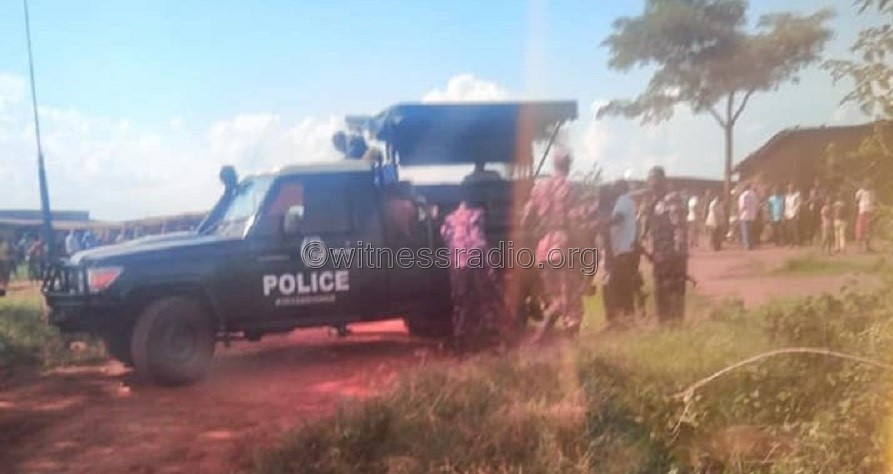DEFENDING LAND AND ENVIRONMENTAL RIGHTS
…..Special Report; Abridged testimony….. Arbitrary arrested and detained for representing PAPs; an experience of the Witness Radio – Uganda lawyer
Published
4 years agoon

By witnessradio.org Team
Joan Buryerali is one of the seven lawyers who were kidnapped during the COVID-19 lockdown in the Kiryandongo district. The basis for the lawyers’ physical interface with Project Affected Persons (PAPs) was to gather more evidence in the run-up to the numerous cases filed against multinationals at the Masindi High Court.
Since 2017, three multinational companies namely; Great Seasons SMC Limited, owned by a Sudanese investor based in Dubai, Kiryandongo Sugar Limited, belonging to one Mauritius family called RAI Dynasty, and Agilis Partners Limited run by American twin brothers (Benjamin Prinz and Phillip Prinz) that are illegally and forcefully evicting more than 35,000 people off their land.
In March 2020, the Government of Uganda issued a directive halting any land eviction during the COVID period. However, this was disregarded; illegal evictions and violations/abuses of human rights continued across the country. Kiryandongo was among the hard-hit districts. Kiryandongo district recorded the highest level of impunity from some powerful investors and security operatives.
In response to the numerous distress calls, a team of seven lawyers set out to collect real evidence from individual community members affected by large-scale agricultural projects. On 29th June 2020, they traveled 220 Kilometers Northwest of Kampala on a mission to address the increased violence meted against the local population.
The actual work started on 30th June 2020. The lawyers drove 45 minutes deep in villages to meet victim communities and work commenced at 0900 hours East Africa Standard time from the hotel.
According to Buryerali, COVID-19 Standard Operating Procedures (SOPs) were observed as each lawyer had to keep a distance from each other and 6 meters with the victim being interviewed.
At around 15:00 hours, anti-riot police attached to Kiryandongo district police under the command of ASP Joseph Bakaleke arbitrarily rounded and forcefully arrested all the lawyers plus the seven (7) victim members that were being interviewed. Police bundled them on a police patrol and another private numbered double cabin vehicle, which was later discovered to be driven by one of the Agilis Partners’ managers.
Below is Joan’s ordeal on the day of the arbitrary arrest and detention;
“We were ordered to stop whatever we were doing and jump onto police vehicles. When we tried to ask for reasons behind our kidnap, the Kiryandongo district Deputy Head of Criminal Investigation Department D/OCCID) Nyakaisiki Beatrice told us it was an order from above. She added that the DPC wanted us at Kiryadongo central police station. At that point, we had no choice but surrender ourselves to the gun wielding police officers who took us to the station.
On reaching there, neither was the District Police Commander (DPC) nor the Resident District Commissioner (President’s representative at the district) in office. There was one Ochenge Ismael, (Officer-in-charge of police unit administration) who stood in for the DPC. We tried to explain the essence of our work but our efforts were futile; the intention was to intimidate and have us detained. The sole purpose for this was to instill fear in us so that we abandon the eviction case.
The police officers had been bribed by these multinational companies to humiliate us before the people we were helping. Subsequent to failure to provide answers, the officer in charge ordered us to remove our shoes, enter the police cells, and wait for the DPC who later showed up the following morning.
While at the station, we kept on asking what crimes we had committed to whoever cared to listen. The D/OC CID insisted that it was an order from above.
After like three minutes another police officer came and commanded our team leader to move out. The same police officer returned and told us to vacant his office since it was time for official closure.
When we moved out, we found other police officers degrading and lifting our team leader by his trousers, yet he was calm. Irked by their inhumane treatment, we asked the police officers to stop harassing him. Our verbal exchange with the police escalated and they threatened to beat us. We were again told to remove shoes and leave our belongings at the police reception. We objected because we could no longer trust them. We instead handed over the items to our driver who would later transferred them to the hotel where we had previously spent the night. That evening, we were separated. The female lawyers were put in a congested cell separate from the one designated for men.
The police cell was very horrible! The foul smell was unbearable. The walls and floor were a mess. There was no cleaner space for any of us to scramble. The stench coming from the toilet was sickening if not stomach-turning! The filthy mattresses emitted urinal and faecal stench. The blankets were equally soiled. They had taken ages unwashed. The disturbing atmosphere kept us awake. At different intervals, each of us planted our nostrils on some big hole on the door to catch some fresh air. Kiryandongo police cell was not fit for human habitant. It was unhealthy for human beings to be there. Worst of all you were told to remove our shoes and move barefoot on such a dirty floor. Every single time I think about how dirty the cell was I feel disgusted. We even failed to eat have dinner. We surrendered our share to the women inmates. There was no way one could comfortably eat something in such a dirty place.
We could not use the sanitary facilities inside the cells. The women we found there had infections as a result of the dirty toilets. We instead accessed the outside facilities barefoot. To our dismay, they were also unclean. The following day, as we left the cell I could not touch my soiled and pathetic feet.
At about 9:00 am, Bakaleke Joseph, the then DPC showed up and we were released on bond. However, what saddened my heart was that the police officers knew that we had not committed any crime but detained us to sabotage our work.
At first, we were released without being charged. But for fear of being questioned, they arrested us again. This time we were charged with the offenses of conducting an unlawful assembly and spreading an infectious disease. These offenses were all false and fabricated. We had followed all COVID rules to the letter. Instead, the anti riot police flouted the rules by not wearing masks during the arbitrary arrest.
Immediately after our release, I imagined how our clients had lost faith in us. I felt harassed and belittled in front of the people I was supporting to get justice. Kiryandongo police painted a picture that they were superior and that the PAPs have nowhere to run to for any immediate assistance.
I have a dented professional because of the arbitrary arrest. I am being viewed as a chaotic person if not a criminal. This is because most people think that police only arrest offenders of the law. I no longer have a clear criminal record in the eyes of the public.
Why Criminalization?
Criminalization may be defined as the use of legal framework strategies targeting HRDs to illegitimate the work of HRDs. Its ultimate aim is to attack HRDs and/or impede their work. The criminalization of human rights defenders’ work through the misuse of criminal law involves the manipulation of the state’s punitive power by state and non-state actors to hinder their work in defense and thus prevent the legitimate exercise of their right to defend human rights
Criminalizing Human rights defenders’ work may lead to stigmatizations and delegitimization which affects the honor and public reputation of HRDs. Many analysts argue that stigmatization is part of the criminalization process. The explanation of why delegitimization, stigmatization, and other forms of disparagement are sometimes equated with criminalization may lie in the fact that they may precede, or occur in parallel to, criminalization processes and that the aim in both cases appears to be to damage the public image of the HRDs so targeted.
“Speaking on behalf of the seven lawyers that were arbitrarily arrested and detained in Kiryandongo during COVID 19 lock-down, the actions of police tarnished our names. A mark was left on our reputation whereby some people in the society see us as chaotic and criminal individuals. Once you’re profiled and your name enters that criminal book, some officials may conclude that you no longer have a clear record.” Said Joan Buryerali
Effects of Criminalization of a PAPs’ lawyer?
There could be more effects to the use criminalize the work of a defense lawyer but, the immediate one is stigmatization. In other words, stigmatization and delegitimization should be considered as causes and/or consequences of criminalization. Criminalization involves the use of criminal charges to attack the work of human rights defenders. It may also be organized in such a way that it questions the personal or professional integrity of the HRDs it targets.
“Some Law firms and Organizations would not want to work with someone who does not have a clean record. They may hesitate to employ you thinking you will become a problem to them. This limits my working opportunities.” Said Bulyerali.
Criminalization may cause a financial burden on the victim HRD. Upon being released either on police bond or court bail, HRDs are required to report back (travel 440 Kilometers on every reporting) until a matter is heard and disposed of. Also, HRDs are forced to hire a lawyer to defend themselves.
Most importantly, criminalization is time-consuming and can ably cause physiological torture. Kampala where I am based and Kiryandongo district, these two places are distant from the other when reporting on police bond or court bail, you need two days on every reporting.
Criminalization has restricted my freedom of expression;
Restrictions on the freedom of expression are aimed at causing generalized fear, intimidating and silencing the denunciations, claims, and grievances of the victims of human rights violations, spurring on impunity, and impeding the full realization of the rule of law and democracy. For stance in Kiryandongo district several lawyers and many community land right defenders, some of them include Stella Akitenge, Atyaluk David Richard, Olupot James, Benon Baryaija and many others have been subjected to inhuman and degrading treatment or tortured, just because they are helping victim communities to mobilize, resist and push back such illegal evictions.
Using the restrictive legal framework to criminalize my work.
Some laws such as the Public Order Management Act, 2013 (POMA), Non-Governmental Organizations Act, 2016, the Anti-Terrorism Act, and the Financial Intelligence Act, have been used by some duty bearers to restrict the extent of work/ operations of HRDs.
In 2013, the POMA was passed to regulate freedom of assembly and ultimately the freedom of association. As seen above, the POMA is often cited by duty bearers to restrict civil society space. The law as it currently stands imposes conditions on holding public gatherings and demonstrations and criminalizes meetings held in contravention of section 5 of the POMA.
The police have on many occasions said that we did not ask for permission before conducting a meeting and they break it up. And yet the POMA only mentions giving notification to the authorized officer if the meeting falls within those regulated by the POMA.
Regarding the seven lawyers that were arrested in Kiryandongo by police, it hind behind POMA to detain the lawyers in cells for the whole night with an aim of not wanting them to proceed with their work and intimidate them. These arrests meanwhile are just to scare them trying to instill fear in them that in case they proceed with their work, they will be dealt with.
Conclusion
In many aspects as already demonstrated above, the COVID-19 period in Uganda presented difficulties and effects on the work of HRDs particularly lawyers for the PAPs, which projects a dark future. The challenging situation shared in this article should be used as a precursor to reflect and discuss the best environment for all defenders to do their work.
Related posts:
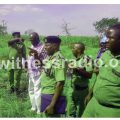
 Human Rights Defenders not safe in Uganda – Unwanted Witness report
Human Rights Defenders not safe in Uganda – Unwanted Witness report
 ……Special Report abridged testimony…… How a pregnant woman was beaten by multinationals and local police over her land…
……Special Report abridged testimony…… How a pregnant woman was beaten by multinationals and local police over her land…
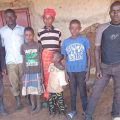 …….Special Report; abridged testimony……. ABDUCTION AND TORTURE: New methods used by multinationals and security agencies to grab land from the poor communities…
…….Special Report; abridged testimony……. ABDUCTION AND TORTURE: New methods used by multinationals and security agencies to grab land from the poor communities…
 Breaking: over 350,000 acres of land were grabbed during Witness Radio – Uganda’s seven months ban.
Breaking: over 350,000 acres of land were grabbed during Witness Radio – Uganda’s seven months ban.
You may like
-


UNFSS loses significance as critical issues affecting smallholder farmers are not mentioned – Criticized by Rights groups and experts
-
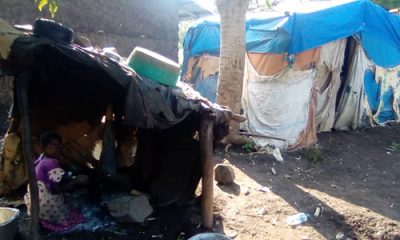

The New Forests Company in Uganda: Villages Evicted, Deceived and Dumped into Poverty
-
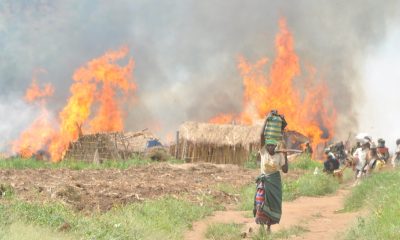

Local land grabbers evict villagers at night; foreign investors cultivate the same lands the next day
-
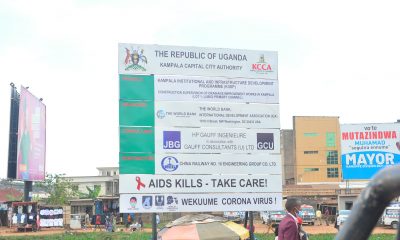

Ugandan communities fighting forced eviction during the COVID-19 pandemic is facing reprisals from the World Bank-funded project implementer, defender arbitrarily arrested
-


Court releases a tortured community land rights defender on bail
-


Breaking! Kiryandongo human rights situation is presented before the United Nations…
DEFENDING LAND AND ENVIRONMENTAL RIGHTS
Crackdown on EACOP protesters intensifies: 35 Activists arrested in just four months.
Published
2 months agoon
April 30, 2025
By Witness Radio team.
Ugandan authorities’ ongoing crackdown on anti-EACOP protest marches is spreading rapidly like wildfires. The East African Crude Oil Pipeline (EACOP) Project, a significant oil infrastructure development, has been a point of contention. Recently, Witness Radio warned that criminalizing the activities of individual activists and environmental defenders opposed to this project, which aims to transport crude oil from Hoima in Uganda to the Port of Tanga in Tanzania, will be regarded as the most disastrous and insensitive to communities’ concerns in Uganda’s history.
In just four months, a series of arrests targeting environmental activists opposing the mega oil project that transports crude oil from Hoima in Uganda to the Port of Tanga in Tanzania has resulted in a scene of crime. No one is allowed to express their concerns peacefully about it and push back on its adverse negative impacts.
While activists view the peaceful marches as a rightful and brave effort to protect the environment and the communities affected by the project, the authorities, including the Uganda police and Prosecutor’s office, regard these actions as attempts to sabotage development projects and resort to criminalization.
Activists and civil society organizations’ reports indicate that the project will likely damage the environment and has displaced thousands of local communities in Uganda and Tanzania.
Despite growing concerns and an intensified crackdown, project financiers and shareholders remain unwavering in supporting the EACOP project. This steadfast support underscores the urgency of the situation. However, environmental and human rights defenders stand firm, resolutely demanding the project’s halt, showing a glimmer of hope in this challenging situation.
Over last weekend, eleven (11) environmental activists were arrested, charged, and sent to prison. They were arrested and detained by police at Kenya Commercial Bank (KCB) premises while attempting to deliver a petition urging the bank to halt its financial support for the 1,444-kilometer heated pipeline project.
The arrest of the eleven activists comes less than a month after nine activists were detained on April 02 outside the Stanbic Bank headquarters while attempting to deliver a petition urging the bank to halt its funding for the project.
The eleven include Bob Barigye, Augustine Tukamashaba, Gilbert Ayebare, Umar Kasimbe, Joseph Ssengozi, Keith Namanya, Raymond Bituhanga, Mohammed Ssentongo, Paul Ssekate, Misach Saazi and Phionah Nalusiba.
KCB Bank Uganda is one of the banks that recently joined the race to fund the EACOP project. Last month, On March 26, 2025, EACOP Ltd., the company in charge of the construction and future operation of the EACOP project, announced that it had acquired additional financing provided by a syndicate of financial institutions, including regional banks such as KCB Bank.
Other banks in the syndicate include the Stanbic Bank Uganda, the African Export-Import Bank (Afreximbank), the Standard Bank of South Africa Limited, and the Islamic Corporation for the Development of the Private Sector (ICD).
The activists appeared before the Nakawa Chief Magistrate Court on April 25. They were charged with criminal trespass. According to section 302 of the Penal Code, a person convicted of criminal trespass is liable to a maximum sentence of one year in prison. This detail underscores the weight of the situation.
The activists are currently on remand at Luzira Maximum Prison and are expected to appear again before the court on May 08, 2025, for mention.
Related posts:

 The latest: Another group of anti-EACOP activists has been arrested for protesting Stanbic Bank’s financing of the EACOP Project.
The latest: Another group of anti-EACOP activists has been arrested for protesting Stanbic Bank’s financing of the EACOP Project.
 Another group of eleven environmental activists have been charged with common nuisance and remanded to Luzira Prison for opposing the EACOP project.
Another group of eleven environmental activists have been charged with common nuisance and remanded to Luzira Prison for opposing the EACOP project.
 Breaking: Eight (8) environmental activists have been arrested by police over protesting against the EACOP project.
Breaking: Eight (8) environmental activists have been arrested by police over protesting against the EACOP project.
 Breaking: 15 Anti-EACOP Activists Arrested in Kampala While Marching to Parliament
Breaking: 15 Anti-EACOP Activists Arrested in Kampala While Marching to Parliament
DEFENDING LAND AND ENVIRONMENTAL RIGHTS
Witness Radio Petitions ODPP urgently to review and withdraw criminal charges against Buvuma Community Land Defenders.
Published
3 months agoon
April 14, 2025
By Witness Radio team.
As Ugandan courts increasingly become tools of oppression, Witness Radio is deeply concerned about the growing trend of weaponizing the justice systems against communities, land, and environmental defenders who resist land grabbing and other harmful land-based investments.
In a well-calculated tactic, land grabbers and investors continue to collude with security agencies, particularly the police, to arrest violently and courts of law to maliciously prosecute hundreds of these defenders for either fighting back against the land-grabbing schemes or criticizing harmful land-based investments in Uganda.
This trend of persecution is not isolated to Buvuma but is a continuous threat in many other parts of Uganda. Buvuma, in particular, is a hotbed of injustice, where the government of Uganda, in collaboration with BIDCO, is implementing the National Oil Palm Project (NOPP) to expand palm oil growing in Uganda.
In our article dated March 5th this year, Witness Radio revealed how community land defenders in Buvuma continued to face judicial harassment on trumped charges simply for defending their land from being grabbed for palm oil plantations.
The accused defenders are residents of the Magyo and Bukula villages in the Buvuma district.
More than a dozen smallholder farmers in these villages situated in Nairambi Sub-county are facing violent evictions from their land and unending persecution. They have been framed with criminal charges for refusing to give away their land for palm oil growing.
The victims are legal owners of bibanja duly registered by Buganda Land Board and recognized as tenants by Buganda Land Board.
Buvuma College school is claiming ownership of the land, while Buvuma district officials, under the guise of protecting Kirigye Forest Reserve, also claim the same land on which these individuals have settled lawfully for decades.
Several community members have been arrested and charged with false criminal offenses.
Among them include community land rights defender Ssentongo, who is currently battling with cases CRB:301/2023, accused of illegally occupying Kirigye forest land (offense of carrying out prohibited activities in forest reserve).
CRB 232/2024 with complainant Kabale Denis (District Forest Officer) charged with carrying out prohibited activities in the forest reserve and CRB 098/2023 on criminal trespass with Buvuma College administration, the complainant.
Others facing persecution are Steven Kyeswa, Kisekwa Richard, and Kibondwe Chrysostom on CRB 141/2024 with assault occasioning actual bodily harm vide Criminal Case No 075 of 2024, among other cases.
As part of efforts to end the ongoing oppression of community defenders in Buvuma, Witness Radio has petitioned the Office of the Director of Public Prosecutions to urgently intervene, review, and withdraw the charges unjustly brought against these defenders.
According to the petition dated March 7th, 2025, the sole intention of these charges is to grab community land without any merits as criminal charges. Sarah Adong, one of the staff attorneys and Head of Witness Radio Legal Aid, reveals that the matters against the accused persons before the court point to the question of land ownership, which can only be answered through civil suits and not criminal charges. It is an apparent injustice.
“Upon thoroughly examining the facts, evidence, and circumstances surrounding these charges, it is evident that they have no merit whatsoever. They amount to vexatious and frivolous prosecution that serves no genuine interest of justice,” the petition by the Land and Environmental Rights Watchdog mentioned.
In an unusual turn of events, the Witness Radio Legal Aid team observed that some of the defenders, including Sentongo, have been charged with criminal trespass twice by the same complainant vide CC No 325 of 2020 and are now facing the same charge by the same party vide CC No 062/2023. This repeated persecution is a heavy burden on these defenders.
“The charges against our client undermine the accused person’s rights under Article 29 (9) of the Constitution of the Republic of Uganda. It has proven that the cases brought against our clients are frivolous and vexatious as they are instituted in a manner that constitutes abuse of court processes,” the petition further read.
Therefore, the organization strongly urges the office of the DPP to exercise its prosecutorial discretion under relevant legal provisions. This is crucial for the prevalence of equity, justice, and good conscience and reaffirming the prosecution process’s integrity and objectivity.
Related posts:
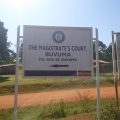
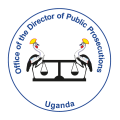 Witness Radio petitions chief prosecutor: Want 34 community land rights defenders and activists released from prison.
Witness Radio petitions chief prosecutor: Want 34 community land rights defenders and activists released from prison.
 Palm Oil project investor in Landgrab: Witness Radio petitions Buganda Land Board to save its tenants from being forcefully displaced palm oil plantation.
Palm Oil project investor in Landgrab: Witness Radio petitions Buganda Land Board to save its tenants from being forcefully displaced palm oil plantation.
 Court charges and remands two community land rights defenders and eight farmers to prison
Court charges and remands two community land rights defenders and eight farmers to prison
 Uganda: Targeting community land and environmental defenders with criminal offenses is rising as two community land rights defenders arrested in a hotspot district of forced land evictions.
Uganda: Targeting community land and environmental defenders with criminal offenses is rising as two community land rights defenders arrested in a hotspot district of forced land evictions.
DEFENDING LAND AND ENVIRONMENTAL RIGHTS
Milestone: Another case against the EACOP activists is dismissed due to the want of prosecution.
Published
3 months agoon
April 8, 2025
By Witness Radio team.
The Buganda Road Chief Magistrate has dismissed another case against 20 anti-EACOP activists due to want of prosecution.
Yesterday, on April 7, 2024, her worship, Jalia Basajjabalaba, dismissed the case against the 20 activists. The case was dismissed after the state failed to produce witnesses pinning the activists on a common nuisance charge after close to 9 months of case trial.
On August 26, 2024, the 20 activists, including Pitua Robert, Okwai Stephen, Kothurach Margret, Omirambe Moses, Owonda Rogers, Alimange Joseph, and Wabiyona Wicklyf, among others, were arrested while peacefully marching to the Ministry of Energy to deliver a petition opposing EACOP and other oil projects. On August 27, 2024, they were arraigned before Court and charged by the Buganda Road Magistrate with common nuisance.
After nearly nine months of trial, the state failed to present a single witness, prompting the magistrate to close the case file.
Although the case against the activists has been dismissed, they remain deeply dissatisfied with the continued pattern of arrests and charges, which often collapse in Court due to a lack of evidence.
Bob Barigye, one of the activists whose case was dismissed, expressed concern over what he described as deliberate attempts to frustrate and silence voices critical of the EACOP project.
“We are saddened that it was just dismissed after eight months of pacing up and down to Court.
We are disappointed that the magistrate did not award us any cost or compensation for the dismissed case, meaning that the state failed to prove that we were a public nuisance and that we were citing violence as activists. Many of us have been forced to travel long distances from our villages to attend court sessions in Kampala — only for the state to produce no evidence against us. It’s a clear waste of our time, energy, and resources. But beyond that, it’s an attempt to discourage us from speaking the truth about the dangers of the EACOP project,” Barigye said.
Barigye added that the activists are already engaging their lawyers to explore further legal remedies in higher courts, demonstrating their unwavering commitment to justice and their cause.
“It is frustrating and deeply disappointing that we are dragged to Court and disrespected every time we stand up against this deadly pipeline, the East African Crude Oil Pipeline (EACOP). But we were ready to face this battle in Court because we knew we had committed no crime by delivering a petition,” Barigye said, expressing the activists’ exasperation with the legal process.
Shortly after their last Court appearance on February 20, the 20 accused activists, during a press briefing, demanded that the judiciary stop delaying hearings of their case related to the EACOP project and called for the dismissal of their case if the Court lacks sufficient evidence to prosecute them.
“The courts of law should not be used as tools of oppression. They should not waste any time. If we have a case to answer, let them prosecute us on April 7, which they have scheduled. If they fail again, they should dismiss the case instead of wasting our time and resources,” the activists emphasized, reiterating their demand for a fair and expedited legal process.
This is the second milestone achieved by the Stop EACOP activists in less than two months in their continued campaign against the EACOP pipeline. In February 2025, the Court also dismissed a common nuisance case against the 15 EACOP activists due to the lack of prosecution.
“The state doesn’t present a single witness in all the cases that have always been preferred against us. No witnesses have come along to say that these people were unruly. As activists, we want to investigate this further and go to the Constitutional Court to learn what constitutes a nuisance. Whoever is demonstrating peacefully is arrested and charged with a public nuisance. This charge is coronial and very demeaning. We want to go ahead and challenge this,” Barigye revealed, outlining the activists’ proactive plans to challenge the charge of public nuisance.
The EACOP project has long been controversial, with environmental activists arguing that it poses a significant environmental risk and has already left a trail of human rights abuses in the communities hosting it in Uganda and Tanzania.
The EACOP is a 1,443-kilometer heated pipeline transporting crude oil from Hoima, Uganda, to Tanga, Tanzania. The first 296 kilometers run through Uganda, while the remaining 1,147 kilometers pass through Tanzania. The project is a joint venture between TotalEnergies, the Uganda National Oil Company (UNOC), the Tanzania Petroleum Development Corporation (TPDC), and the China National Offshore Oil Corporation (CNOOC).
Related posts:

 Another group of eleven environmental activists have been charged with common nuisance and remanded to Luzira Prison for opposing the EACOP project.
Another group of eleven environmental activists have been charged with common nuisance and remanded to Luzira Prison for opposing the EACOP project.
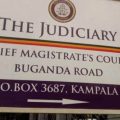 Breaking: The Bail Application for the 15 EACOP Activists flops for the second time, as the trial magistrate is reported to have been transferred.
Breaking: The Bail Application for the 15 EACOP Activists flops for the second time, as the trial magistrate is reported to have been transferred.
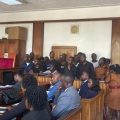 Breaking: Buganda Road Court grants bail to 15 stop EACOP activists after 30 days in prison.
Breaking: Buganda Road Court grants bail to 15 stop EACOP activists after 30 days in prison.
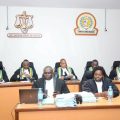 EACJ’s Appellate Court will hear an appeal on the dismissed Case against EACOP development.
EACJ’s Appellate Court will hear an appeal on the dismissed Case against EACOP development.

Activism on Trial: Despite the increasing repressive measures, Uganda’s EACOP protesters are achieving unexpected victories in the country’s justice systems.

Communities Under Siege: New Report Reveals World Bank Failures in Safeguard Compliance and Human Rights Oversight in Tanzania

A decade of displacement: How Uganda’s Oil refinery victims are dying before realizing justice as EACOP secures financial backing to further significant environmental harm.

Carbon Markets Are Not the Solution: The Failed Relaunch of Emission Trading and the Clean Development Mechanism

A decade of displacement: How Uganda’s Oil refinery victims are dying before realizing justice as EACOP secures financial backing to further significant environmental harm.

Govt launches Central Account for Busuulu to protect tenants from evictions

Activism on Trial: Despite the increasing repressive measures, Uganda’s EACOP protesters are achieving unexpected victories in the country’s justice systems.

Top 10 agribusiness giants: corporate concentration in food & farming in 2025

Innovative Finance from Canada projects positive impact on local communities.
Over 5000 Indigenous Communities evicted in Kiryandongo District
Petition To Land Inquiry Commission Over Human Rights In Kiryandongo District
Invisible victims of Uganda Land Grabs
Resource Center
- LAND GRABS AT GUNPOINT REPORT IN KIRYANDONGO DISTRICT
- RESEARCH BRIEF -TOURISM POTENTIAL OF GREATER MASAKA -MARCH 2025
- The Mouila Declaration of the Informal Alliance against the Expansion of Industrial Monocultures
- FORCED LAND EVICTIONS IN UGANDA TRENDS RIGHTS OF DEFENDERS IMPACT AND CALL FOR ACTION
- 12 KEY DEMANDS FROM CSOS TO WORLD LEADERS AT THE OPENING OF COP16 IN SAUDI ARABIA
- PRESENDIANTIAL DIRECTIVE BANNING ALL LAND EVICTIONS IN UGANDA
- FROM LAND GRABBERS TO CARBON COWBOYS A NEW SCRAMBLE FOR COMMUNITY LANDS TAKES OFF
- African Faith Leaders Demand Reparations From The Gates Foundation.
Legal Framework
READ BY CATEGORY
Newsletter
Trending
-

 SPECIAL REPORTS AND PROJECTS4 days ago
SPECIAL REPORTS AND PROJECTS4 days agoActivism on Trial: Despite the increasing repressive measures, Uganda’s EACOP protesters are achieving unexpected victories in the country’s justice systems.
-

 NGO WORK1 week ago
NGO WORK1 week agoCommunities Under Siege: New Report Reveals World Bank Failures in Safeguard Compliance and Human Rights Oversight in Tanzania

